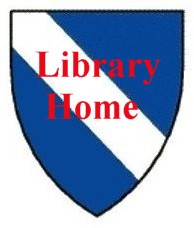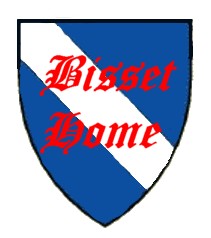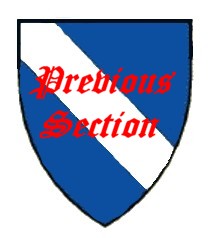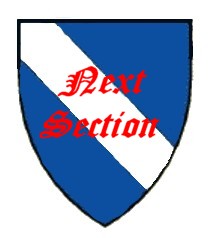
Appendix IV:
The Treaty of Falaise
(December 1174)

 |
Appendix IV:
|

|
[Taken from “English Historical Documents, vol, ii., p 446.]
William the Lion, king of Scots, who supported the rebellion of the sons of Henry ii, was captured near Alnwick in the autumn of 1174 and was brought as a prisoner to Normandy. In December 1174 at Falaise he was forced to agree to the following terms. This is an intensely feudal document and a savage treaty, which marks the climax of the power over Scotland exercised by the kings of England in the middle Ages. It was renounced by Richard I in 1190. The text is in Rymer, Foedera (1704), 39 f., from a documentary source; and in Gesta Regis Henrici Secundi, ed. Stubbs, I, 96-8. A similar document, almost identical was the Falaise text except that there are additional witnesses, was dawn up apparently shortly afterwards, at Valognes on 8 December 1174; this is printed in Liber Niger Scaccarrii, ed. Hearne (1728), I 36-40.
This is the agreement and treaty which William, King of Scots, made with his lord king, Henry, son of Maud, the Empress. William, King of Scots, has become the liegeman of the lord king (Henry) against every man in respect of Scotland and in respect of all his other lands; and has done fealty to him as to his liege lord, as to all men of the lord king (Henry) are wont to do. Likewise, he has done homage to Henry the king (The young king, crowned as his father’s heir in 1170, died without issue in 1183.) son of King Henry, saving only the fealty which he owes to the lord king, his father.
And all the bishops and abbots and the clergy of the King of Scots and their successors shall do fealty to the lord King (Henry) as to their liege lord, in the same way as the lord king’s other bishops are wont to do; and they shall likewise do fealty to Henry the king, his son, and to his heirs.
And the King of Scots, and David, his brother, and his barons and other men, have granted to the lord king (Henry) that the Scottish Church shall make such submission to the English Church as it ought to do, and as it was wont to do in the time of the lord king’s predecessors. Kings of England. Likewise, Richard, bishop of St Andrews, and Richard, bishop of Dunkeld, and Geoffrey, abbot of Dunfermline, and Herbert, prior of Coldingham, have granted that the English Church should have such rights in Scotland as it ought to have, and that they will themselves not oppose any of these rights of the English Church. And they have pledged themselves in respect of this admission by performing liege fealty to the lord king and Henry, his son.
Likewise the other Scottish bishops and clergy shall do so by a pact made between the lord king (Henry) and the King of Scots, and David, his brother, and his barons.
The earls and barons and other such men holding land from the King of Scots as the lord king (Henry) may select, shall also do homage to the lord king as against all men, and shall swear fealty to him as their liege lord, in the same way as his other men are wont to do. And they shall do the same to Henry the king, his son, and to his heirs, saving only the fealty which they owe to the lord king, his father. Likewise, the heirs of the King of Scots, and of his barons and of his men shall do liege homage to the heirs of the lord king (Henry) against all other men.
Further, the King of Scots and his men shall not receive, either in Scotland or in any of his other lands, any exile from the lands of the lord king who has been expelled there from by reason of felony, unless he wishes to justify himself in the court of the lord king (Henry), and to submit to the judgement of his court. Otherwise, the King of Scots and his men shall take such a one as quickly as they can and bring him to the lord king (Henry) or to his justiciars or his bailiffs in England.
Again if there comes to England any fugitive expelled as a felon from the lands of the King of Scots he shall not be received in the lands of the lord king (Henry) unless he wishes to justify himself in the court of the King of Scots, and to submit to the judgement of his court. Otherwise such a one shall be delivered to the men of the king of Scots by bailiffs of the lord king (Henry) wherever he is found.
Further, the men of the lord king (Henry) shall continue to hold lands which they held, and which they ought to hold, from the lord king (Henry) and from the King of Scots and from their men. And the men of the king of Scots shall continue to hold the lands which they held, and which they ought to hold, from the lord king (Henry) and from his men.
In order that this treaty and the pact with the lord king (Henry) and Henry the king, his son, and their heirs, may faithfully be kept by the King of Scots and his heirs, the King of Scots has delivered to the lord king (Henry) the castle of Roxburgh, and the castle of Berwick, and the castle of Jedburgh, and the castle of Edinburgh, and the castle of Stirling to be held by the lord king (Henry) at his pleasure. And the King of Scots shall pay for the garrison of these castles out of his own revenue at the pleasure of the lord king (Henry).
Further, in pledge of the aforesaid treaty and pact, the King of Scots has delivered to the lord king (Henry) his brother, David, as a hostage, and also the following:
Earl Duncan, Richard Comyn, Robert Frembert
Earl Waldewin, Walter Corbet, Richard de Burneville
Earl Gilbert, Walter Olyfard, Hugh Giffard
The Earl of Angus, John de Vals, Hugh Rydal
Richard of Morville, William of Lindsey, Walter Berkeley
The Constable Philip de Coleville, William de la Haye
Niz, son of William Philip of Valognes, William de Mortemer
When these castles have been handed over, then shall William, King of Scots, and David his brother, be released. And (again after the castles have been handed over) the earls and barons aforesaid shall be released, but only after each one has delivered his own hostage, to wit, his legitimate son if he has one. Or otherwise his nephew or nearest heir.
Further the King of Scots and his barons aforesaid have guaranteed that with good faith and without evil intent and without excuse, they will see to it that the bishops and barons and other men of their land, who were not present when the king of Scots made his pact with the lord king (Henry) and with Henry the king, his son, shall do the same liege and fealty as they themselves have done. And the barons and men, who were not present at this agreement, shall give such hostages as the lord king (Henry) shall determine.
Further, the bishops, earls and barons aforesaid have covenanted with the lord king (Henry) and with Henry the king, his son, that if the king of Scots shall by any mischance default in his fealty to the lord king (Henry) and his son, and shall break the aforesaid agreement, then they the aforesaid bishops, earls and barons will hold to the lord king (Henry) as to their liege lord against the king of Scots and against all men hostile to the lord king (Henry). And the bishops shall place the land of the king of Scots under interdict until the king of Scots returns to the lord king (Henry) in his fealty.
The king of Scots and David, his son, and all the aforesaid barons, as liege men of the lord king (Henry) and of Henry. His son (saving only their fealty to the lord king, his father), have given full sworn assurance that the aforesaid treaty shall be strictly observed by them in good faith and without any evil intent.
And these are the witnesses: Richard, bishop of Avranches,
John, dean of Salisbury; Robert, abbot of Malmsbury; Ralf, abbot of Montebourg;
Herbert, archdeacon of Northampton; Walter of Coutances; Roger, the king’s
chaplain; Osbert, clerk of the chamber; Richard, son of the lord king, and count
of Poitou, Geoffrey, son of the lord king, and count of Brittany; William, earl
of Essex; Hugh, earl of Chester; Richard Le Hommet, the constable; the count
of Meulan; Jordan Tesson, Humphrey de Bohun; William of Courcy, the seneschal;
William, son of Aldhelm, the seneschal; Alfred of Saint-Martin, the seneschal;
Gilbert Malet, the seneschal.
At Falaise.
The document dated at Valognes, and given in the Liber Niger Scaccarii, adds the following witnesses: Reginald de Curtenai; Faulk Paynel; Geoffrey de Pertico; William of Le Hommet; Jordan of Le Hommet; Ingelram of Le Hommet; Ralf Tesson; Roger, his brother; Robert Bertram; Richard of Vernon; William Vavasur; Robert of Mortemer; Robert son of Bernard Pulhere; Bertram of Verdun; Roger Bacun - it is interesting to observe that the ratification at Valognes, Richard of Le Hommet, the famous constable of Henry ii, brought in his relatives as witnesses, for Le Hommet, the ancestral home of the family is very close to Valognes.
When we consider that King William was captured on 13th July 1174 and according to the reports, more or less on his own with only a minimal escort; yet by 11th of December when he leaves Falaise and starts on his return to Scotland. In the intervening period of five months held as a prisoner but still managing to organise hostages, his brother David and other Scottish magnates and churchmen either to have joined him in Falaise [the bishops of St Andrews, Dunkeld and Dunfermline had sworn allegiance to Henry so were there at the time] or there had been sufficient communication between them for them to be party to the Treaty. While as King he could in theory sign anything without consent or consultation, it seems inconceivable that he would have dared to sign this Treaty without the knowledge of the Scottish peerage and church. I consider the whole system and speed of communication very impressive. The movements of King Henry taken from the Court, Household and Itinerary of give some idea of the movements of both monarchs.
| Year | Day/Month | Item |
|---|---|---|
| 1174 | January | Hugh bishop of Durham agrees a truce with William I until Easter. |
| April | William besieges Carlisle and ravages Northumberland. David takes Castles at Knaresborough and Appleby. William continues to ravage Northumberland takes Warkworth and four other castles. | |
| July 13th | Henry II continues his penance at Canterbury and sets out for London. On the same day a party of royalists after a forced march capture William I then at the siege of Alnwick. They are Robert de Stuteville, sheriff of Yorkshire, Ranulf de Glanvill, William de Vesci, Betmard de Bailiol, Ralf de Tilli and Odonele d’Umfravill. | |
| July | Henry II, ill in London, hears news of William’s capture. | |
| July 31st | William brought to Northampton as prisoner where Henry is after attending the siege of Huntingdon. | |
| August 8th | Henry sails from Portsmouth taking as prisoners King of Scots, Earls of Chester, Leicester and Ferres. | |
| August 8th | Henry lands at Barfleur and moves to Rouen leaving his prisoners at Caen; they are then moved to Falaise. | |
| December 1st | King of Scots a prisoner at Falaise comes to terms with Henry, an Instrument of Pacification is dated Falaise and attested. | |
| December 11th | William obtains his release and sails for England. | |
| 1175 | August 10th | Henry II and Prince Henry are in York. William King of Scots and brother David the Bishops, Abbots and Nobles of Scotland attend the court and do homage to both father and son (Henry II and the Young Henry) |
 |
Appendix IV:
|

|